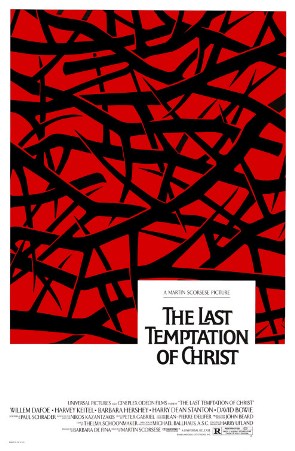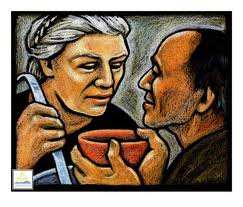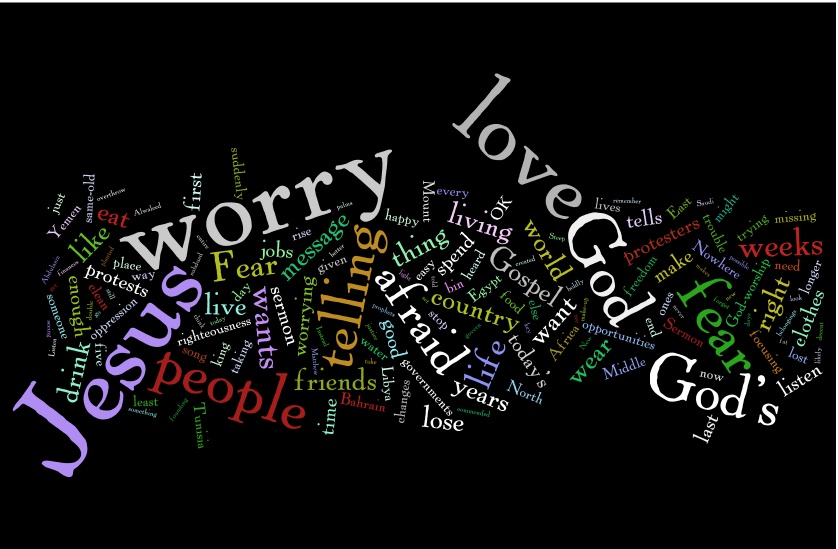John 11:1-45
 in reality, the author’s and director’s great “What if …?” exploration of the life of Jesus. “What if,” they ask, “Jesus had given in to temptations offered him? What if he hadn’t died on the cross?”
in reality, the author’s and director’s great “What if …?” exploration of the life of Jesus. “What if,” they ask, “Jesus had given in to temptations offered him? What if he hadn’t died on the cross?”I can tell you that many, many people were quite upset about this movie, because it is very challenging to them. The question of “What if …?” forces you to examine your faith, and to examine everything you know about Jesus.
But regardless of how you feel about the movie as a whole, there is one scene in it that is absolutely stunning in its power, the scene of the resurrection of Lazarus.
In this scene, Jesus goes to the grave of his friend Lazarus, the one whom he loved, led by Mary and Martha, followed by his disciples, surrounded by mourners. Once there, he orders the people there to remove the stone at Lazarus’ tomb.
Remember, Lazarus has been dead for four days by now; Lazarus’ sister, Martha, objects, warning Jesus of the stench. (I do so love the King James Version of this Gospel: “Lord, by this time he stinketh!”) And indeed, when some of the men open the grave, the stench of Lazarus’ rotting body causes everyone present to gasp and cover their noses and mouths, and watching, you find yourself waiting for that next scene, showing people becoming ill.
But that doesn’t happen.
Instead, Jesus takes a deep breath, goes to the entrance, to this black hole cut into the side of a hill, says a prayer to his Father in heaven, and calls to Lazarus: “Lazarus, come out!”
Unlike in today’s Gospel, where Jesus cries out in a loud voice but one time, Martin Scorsese, the film’s director, has Jesus call twice, in a much gentler voice: “Lazarus. Lazarus! Come out. Come out!”
But nothing … happens … So Jesus crouches by that black opening of the tomb, staring into the darkness while the silence – and the tension – builds. The only noise is that of the flies, buzzing around the body in that lightless tomb.
For 15 … seconds … nothing happens.
Jesus stares into the darkness and twice more, very gently, calls out: “Lazarus … Lazarus …”
Still, nothing happens … for another … 10 … seconds …
And then … suddenly …
… a hand shoots out of the grave!
Everyone jumps back in shock, including Jesus …
… who then reaches into the grave with a trembling hand, takes Lazarus by his decaying hand, and begins to pull him out. But Lazarus resists and actually pulls Jesus part-way into the tomb. So Jesus uses both of his hands and braces himself and tugs Lazarus out of the darkness of death and back into the light of life …
… Thus proving, in no uncertain terms, that it is never too late …
… It is never too late for Jesus to reach into the darkness of our lives, into the graves in which we find ourselves buried, to resurrect our lives and to give us new life.
It is never too late for Jesus to unbind us from all that holds us in our graves and in the darkness and set us free
Even when we have been in the graves of our lives so long that decay has set in, even then, it is never too late for Jesus, because we are never beyond his reach.
• • •
Russian Icon. The Raising of Lazarus. 15th century. Novgorod school. The Russian Museum, St. Petersburg, Russia
This recounting of Lazarus’ death and resurrection, which appears only in John’s Gospel, is a story of resurrection, of new life, of being set free – by God – from everything that buries us, from everything that binds us, everything that separates us from the love of God in Christ Jesus, everything that keeps us from living the life that God dreams of for us.
Face it, we all spend time in the grave, we all live in darkness at times, we all find ourselves bound up … by fears, by anxiety, by grief and mourning, by despair and loneliness.
This is the Washington Metro area, and we know what it means to live with anxiety. We’ve been stuck at Orange Terror Alert since September 2001. We know that, right? For us, it’s just the norm. But anyone who comes here to visit from someplace that is not under Code Orange wonders if there’s something going on that they should know about.
How many of you pay any attention any more?
And how many of you drive on (Interstate) 95, or 395 or 495, and see those signs, “Report suspicious activity”? Really? How do you define “suspicious”? I’d love to report people speeding and weaving in and out of traffic, but I don’t think that’s what Homeland Security has in mind.
How many of you here ride the Metro? I know we take the Code Orange level for granted, but how would you feel if you saw someone get off one of the trains and leave behind a knapsack under a seat? Would you feel anxious? More anxious than normal?
And how many of you receive a paycheck from the federal government? Or have someone in your family, or know someone, who gets one? Talk about anxiety and fear! I don’t get a paycheck a federal paycheck, and I was checking every 10 minutes on Friday night, waiting to find out if the government was going to be shut down, or if an agreement could be reached. How much anxiety and fear did you experience on Friday, wondering if you would have enough money to pay your mortgage come Tuesday, or whether you would be able to make the down-payment on the tuition so your high school senior could go to the college of her choice? Or feared you would not be able to pay your credit card bill? All because our leaders seem to have forgotten that they are supposed to be servants of the Lord, and are not Masters of the Universe?
And then at the last possible second, just in time for the 11 o’clock news, our leaders announced that they would not shut down the government and we could all breathe a sigh of relief.
Oh, yes, we know anxiety here and we know how it can plunge us into the depths of darkness and feel like a grave to us. We know what it means to be bound up.
But I am telling you, Jesus is standing right here … right here … this very minute, with us, calling each of us by name, reaching into the graves of our lives and pull us out of that darkness, using both hands if necessary, so that we can be restored to the light.
Jesus is right here, because he loves us just as he loved Lazarus.
And he is crystal clear: “I am the resurrection and the life.” And all who believe in him have life … because he loves us.
Now, I don’t want you to leave this place today and say that the preacher told you could wander through life, throwing your arms in the air and proclaiming to everyone, “Jesus loves me! Isn’t life great?”
Because Jesus does not pull us out of the grave just so we can wander around and practice happy-clappy Christianity. Because Christianity is not supposed to be happy-clappy. And for darned sure that isn’t what it means to be an Episcopalian. Resurrection is serious business.
Jesus is the Resurrection and the Life, and he is in our lives, giving us the same gift he gave to Lazarus: new life so that we can go forth into the world to love and serve the Lord!
This new life that Jesus gives us is a life of service. It’s a call to us to delight in God’s will, to walk in God’s ways to the glory of God’s name!
Being set free is not about us – it’s about God and God’s dream for us.
We are set free so that we can exactly what God is calling us to do …
… to feed the hungry and give water to the thirsty …
… to make the blind see and the deaf hear and the mute sing and the lame leap with joy …
… to proclaim the year of the Lord’s favor not once every 50 years, but every year!
Jesus is standing at our graves, my friends. He has said the prayers over us. And he is calling us – each of us – by name.
He is reaching into the darkness of our lives, grasping our already decaying hands and pulling us … tugging us … dragging us out of our graves …
He is taking us out of that darkness that binds us, and setting each one of us free.
He is calling us …
Lazarus!
Lazarus!
Do you hear him?
Amen.
• • •
A sermon preached on the Fifth Sunday of Lent, Year A, 10 April 2011, at St. George’s Episcopal Church, Arlington, Va.






